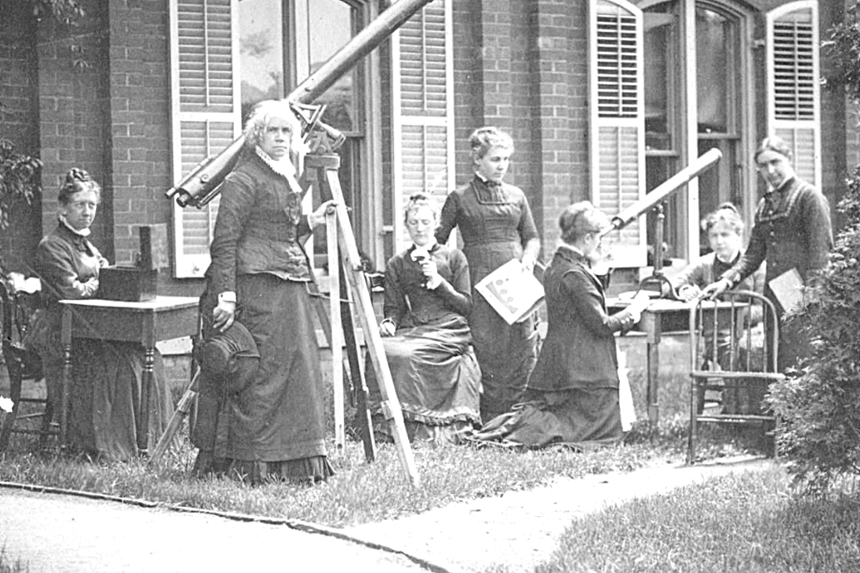Our crosspost today is from a newly released whitepaper edited by Ava Polzin and Katherine E. Whitaker about the challenges women in astronomy face and how these might be overcome.
 |
| Cover: Illustration of Vera Rubin, based on the 1948 picture of her at the Vassar College Observatory from the Carnegie Science Vera C. Rubin Photograph Collection. The background is one of the first light images from the NSF-DOE Vera C. Rubin Observatory released June 2025. It is the first major observatory to be named after a woman. All art by Julie Malewicz. |
Summary:
Women are consistently underrepresented in astrophysics yet are simultaneously subject to disproportionate attrition at every career stage. This disparity between demonstrated efficacy in job performance and ultimate career outcome was the primary motivation for the Picture an Astronomer series, which included both targeted public outreach to increase representation of women in astrophysics and high-level, solution-oriented discussions among professional astronomers.
In March 2025, more than 200 astronomers came together in a hybrid-format symposium focused on the state of the field for female scientists, combining scientific exchange with discussions of policies and practices to strengthen retention of talent in the field. This white paper is the result of those discussions, offering a wide range of recommendations developed in the context of gendered attrition in astrophysics but which ultimately support a healthier climate for all scientists alike.
Excerpt from the foreword by C. Megan Urry:
One particular conversation when I was a postdoc in the 1980s clarified both the ubiquity and inaccuracy of the upside-down notion that women had it easier than men. It started with the usual statement from a male colleague that, thanks to affirmative action, I would have no difficulty advancing in the field (a claim wildly contrary to the lack of encouragement I experienced to that point). I challenged him to substantiate that view. He launched into a story about a woman hired as faculty at a top university despite her complete lack of qualifications, and despite overwhelming competition from an outstanding young man for whom the job had actually been intended. But an interfering Dean had insisted that this woman be added to the short list and then insisted that she be hired. I might have believed this story—after all, such stories were commonplace—but when I asked who the woman was and what her research area was, the storyteller didn’t know any details.
Wait, I said, you don’t know who she is or what she does but you are sure she was unqualified? “Everyone knows this is true,” he responded.
As scientists, we know this isn’t how evidence and scientific analysis is supposed to work. Before coming to conclusions, we seek facts and are skeptical of broad claims— you don’t just accept some story because it aligns with your beliefs. Later, I happened to meet someone who had been on the actual search committee for that position. When I recounted the story to him, he—a person who was there, who participated in the deliberations and the decision to hire this woman—told me the story was flat out wrong.
In fact, the woman had been on the short list from the get-go and was hired because she was the strongest candidate by far. According to this first-hand account, she blew the rest of them out of the water, including the young man who was a supposed shoo-in. This jolted me into a new awareness of the realities of my profession. I began to see that women2 were judged differently than men—indeed, much more harshly—which the social science literature confirms. We were less likely to be seen as academic stars, more likely to be criticized or overlooked. At the Space Telescope Science Institute (STScI), created in 1981, the tenure-track staff included only one woman (Neta Bahcall) among the first 60 people hired. This was despite the fact that women received 10-20% of the PhDs in astronomy in the 1980s. I was the third woman hired onto the tenure track, after Anne Kinney.
She and I started asking, “Why so few?”





